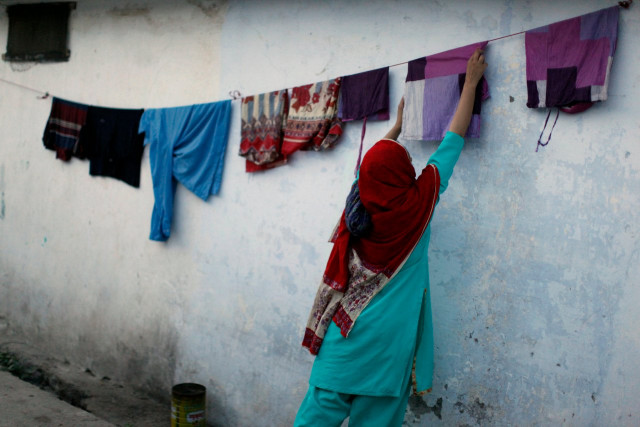Girls spend 40 per cent more time on unpaid household chores than boys: report
International Day of the Girl, on October 11, was set up by the UN in 2011

A woman hangs laundry to dry outside her house in Rawalpindi near Pakistan's capital Islamabad May 1, 2009. PHOTO: REUTERS
The United Nations Children's Fund (UNICEF) said girls are spending 160 million more hours a day on household work such as cooking, cleaning, looking after family members and collecting water and firewood.
Woman harassed by female ‘moral police’ in Karachi
Girls in South Asia, the Middle East and parts of Africa make up the bulk of the report, which also found that girls aged 10 to 14 took on the most disproportionate burden of chores in Burkina Faso, Yemen and Somalia. "The overburden of unpaid household work begins in early childhood and intensifies as girls reach adolescence," said UNICEF's Principal Gender Advisor Anju Malhotra.
‘55% women in Karachi face harassment’
"As a result, girls sacrifice important opportunities to learn, grow, and just enjoy their childhood. This unequal distribution of labour among children also perpetuates gender stereotypes and the double-burden on women and girls across generations." Analysts said gender inequality continued to pose a major challenge to meeting the UN's new set of global goals agreed last year to end extreme poverty and address the lack of opportunities and violence against women by 2030.
Almost 80% of Indian women face public harassment in cities: survey
International Day of the Girl, on October 11, was set up by the United Nations in 2011 to recognise the rights of the 1.1 billion girls around the world and the challenges they face. Researchers said addressing issues such as violence, child marriage, female genital mutilation and education as well as empowering girls to reach their potential was not only beneficiary for girls, but key for economic growth, peace and poverty reduction.
A report by the children's charity Plan International earlier this week warned millions of girls would remain at risk until there were better statistics and data to track issues such as sexual violence against girls and school attendance.



















COMMENTS
Comments are moderated and generally will be posted if they are on-topic and not abusive.
For more information, please see our Comments FAQ